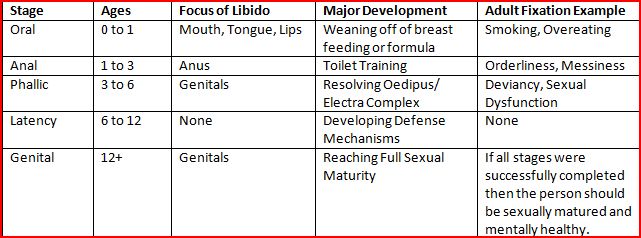
Identity: answers the question "who am I?"
Defined as: an internal process that involves genetic, social, and psychological concepts that change constantly, and an inward view of self that is affected b nature and nurture, others' perceptions, and your own self-concept.
Important for self-development because knowing your identity is key to a successful and well-rounded life.
Development of Self
Self-Concept is developed as children grow, and builds out of a self-schema, which is an understanding of self that is based on previous social experience.
Possible Selves is defined as what a person expects to become, would like to become, or is trying to avoid becoming. This is based on connecting current existence with dreams for the future. Academic and career expectations are examples of this.
Personality is a combination of unique qualities that individualize a person.
Freud's Theory of Personality and Psychosexual Stages of Development
Theory of Personality teaches a balance between three parts: id, ego, and superego. A balance between these is essential for healthy development.
Defined as: an internal process that involves genetic, social, and psychological concepts that change constantly, and an inward view of self that is affected b nature and nurture, others' perceptions, and your own self-concept.
- Identity gives us a way to organize and access our own lives throughout developmental stages.
- Identity is comprised of viewing oneself through many different roles.
- Identity is a gestalt, as it combines many concepts, both social and biological.
Important for self-development because knowing your identity is key to a successful and well-rounded life.
Development of Self
Self-Concept is developed as children grow, and builds out of a self-schema, which is an understanding of self that is based on previous social experience.
Possible Selves is defined as what a person expects to become, would like to become, or is trying to avoid becoming. This is based on connecting current existence with dreams for the future. Academic and career expectations are examples of this.
Personality is a combination of unique qualities that individualize a person.
Freud's Theory of Personality and Psychosexual Stages of Development
Theory of Personality teaches a balance between three parts: id, ego, and superego. A balance between these is essential for healthy development.
Ego Strength is the ego's ability to function in spite of demands from the Id and pressures from the Superego.
Psychosexual Stages of Development teaches that stages culminating in the buildup of sensual and erogenous energy develop within certain areas of the body at specific times. Every stage consists of a conflict, and if a person doesn't overcome that conflict, a fixation will develop in adult life. With full conflict resolve, the release of the libido occurs and the result is pleasure, both psychological and physical. These stages are oral, anal, phallic. latency and genital.
Erikson's Eight Ages of Man adapted from Freud's theory, but differs because of a stronger focus on social and cultural parts of development instead of sexual aspects. Erikson focused on a series of crises that humans face through the lifespan, and believed that with overcoming each crisis, balance occurs in life. Each stage is affected by individual differences, and either a positive effect or virtue is obtained, or a negative outcome or pathology. Virtue is seen in hope, love, and determination, while pathology is seen in isolation, peer inferiority, and mistrust.
James Marcia's Identity Statuses focuses on identity in career, religious, and political ideology. Marcia's study focuses on development across two different spectrum: crisis and commitment.
Crisis is developed during adolescence, and focuses on experimentation with multiple career choices and career ideology.
Crisis is developed during adolescence, and focuses on experimentation with multiple career choices and career ideology.






